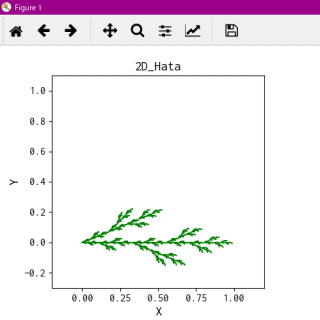pyob
Python PyObject wrapper for C++ matplotlib numpy wx etc
(web) https://nomissbowling.github.io/pyob
(repository) https://github.com/nomissbowling/pyob
ScreenShot

- https://github.com/nomissbowling/pyob/blob/master/docs/img/pyob_fractal_hata_00.png?raw=true
Requirements
matplotlibcpp.h https://github.com/lava/matplotlib-cpp
tested matplotlib-cpp version (hash 00a4766) 2018-10-06
tested with Python 3.6.1 (64-bit)
tested with Visual C++ 2017
Environments
set QT_QPA_PLATFORM_PLUGIN_PATH=%PYTHONHOME%/Library/plugins/platforms
Sample
#define _USE_MATH_DEFINES // M_PI = 3.14159265358979323846...
#include <cmath>
#include <vector>
#include <iomanip>
#include <iostream>
#include <stdio.h>
#include "pyob.h"
// #include "matplotlibcpp.h"
#pragma comment(lib, "python36.lib")
using namespace std;
using namespace pyob;
namespace plt = matplotlibcpp;
int main(int argc, char **argv)
{
PyBase::version();
int n = 500;
vector<double> x(n), y(n);
for(int i = 0; i < n; ++i){
x[i] = i;
y[i] = sin(i * M_PI / 180.0);
}
plt::plot(x, y, "--r");
PyBase::begin(L"dummy");
try{
PyMod np("numpy");
PyBase a = (np|"array")(MKTPL(PYTPL(PYTPL(PYLNG(1), PYLNG(2)), PYTPL(PYLNG(3), PYLNG(4)))), {});
PYREPR(stdout, a);
PyBase b = (np|"identity")(MKTPL(PYLNG(2)), {});
PYREPR(stdout, b);
PyBase c = a * b;
PYREPR(stdout, c);
PyBase d = a & b;
PYREPR(stdout, d);
PYREPR(stdout, a & a);
}catch(const std::exception &e){
fprintf(stderr, "exception[%s]\n", e.what());
}
try{
PyMod np("numpy");
fprintf(stdout, "%20.17lf\n", double(np|"pi")); // 3.14159265358979323846...
fprintf(stdout, "%20.17lf\n", double(np|"e")); // 2.71828182845904523536...
PyBase x = (np|"arange")(tie(PYLNG(-99), PYLNG(99), PYDBL(.2)), {});
PyBase y = (np|"arange")(tie(PYLNG(-30), PYLNG(30), PYDBL(.1)), {});
PyBase m = (np|"meshgrid")(tie(x, y), {});
PyBase zz = (np|"cos")(MKTPL(m[0]), {}) * (np|"sin")(MKTPL(m[1]), {});
// PyBase zz = (np|"sqrt")(MKTPL((m[0] ^ 2) + (m[1] ^ 2)), {});
PyMod pyplot("matplotlib.pyplot");
PyBase ax = (pyplot|"contour")(MKTPL(m[0] * 3.5, m[1] / 5.0, zz), {});
}catch(const std::exception &e){
fprintf(stderr, "exception[%s]\n", e.what());
}
plt::show();
try{
PyMod _builtins("builtins");
PyBase _h = (_builtins|"bytes"|"fromhex")(tie(PYSTR("55AA")), {});
PyBase::s((wchar_t *)_h);
PyMod wx("wx");
PyBase app = (wx|"App")();
PyBase frm = (wx|"Frame")(tie(PYNONE, PYLNG(-1)), {
{"title", PYSTR("TEST wx")},
{"size", PYBV("ii", 640, 480)}, {"pos", PYBV("ii", 320, 240)} });
const char *ascicon =
"789cc592310e8330100497e006450afe41a8229e41e187f184b4f9457a1a3f27\x0A"
"657a8acbad6d029130a241597b59e6245b823ba0c0094d63350d5e27e006c0da\x0A"
"c86d015c4aa0d55aa3eed4ac6fab0f1b7d1f834b5fbcf79aac48d81089c1c512\x0A"
"1f07ab7a50f73c4be2f3403df32cbb395cbc60e35439d6d346f2ccab220fdbbc\x0A"
"f8e6c0aedbcf6e9b8f94ac08e5648f55e7eefaba9455af88736e1167fd1f735e\x0A"
"a571a999dacf902313212b9d966e649f6bd70d29e389d473f3d3fbecbf91e882\x0A"
"ee672ff5a6afb3a733f407b4ecff08\x0A";
PyStr ascdat(ascicon);
PyBase hex = (ascdat|"replace")(tie(PYSTR("\n"), PYSTR("")), {});
PyMod binascii("binascii");
PyBase binicon = (binascii|"a2b_hex")(tie(hex), {});
PyMod zlib("zlib");
PyBase bindat = (zlib|"decompress")(tie(binicon), {});
PyMod pyio("io");
PyBase strm = (pyio|"BytesIO")(tie(bindat), {});
PyBase im = (wx|"Image")(tie(strm), {});
PyBase bm = (wx|"Bitmap")(tie(im), {});
PyBase icon = (wx|"Icon")();
(icon|"CopyFromBitmap")(tie(bm), {});
(frm|"SetIcon")(tie(icon), {});
(frm|"Show")();
(app|"SetTopWindow")(tie(frm), {});
(app|"MainLoop")();
PyMod sys("sys");
(sys|"path"|"append")(tie(PYSTR(".")), {});
PyMod mm("mm"); // mm.py (test module) must be at '.'
PyBase mc = (mm|"mc")(tie(PYLNG(1234)), {});
PyBase r = (mc|"pi")(tie(mm, mc), { {"a", mm}, {"b", mc} });
}catch(const std::exception &e){
fprintf(stderr, "exception[%s]\n", e.what());
}
PyBase::end();
return 0;
}
mm.py (test module)
class mc(object):
'''test data overwritten by self.n after construction'''
n = 9999
def __init__(self, n):
self.n = n
print('TEST mc')
def pi(self, *args, **kwargs):
print(f'TEST mc.pi ({len(args)}), {kwargs.keys()}, self.n={self.n}')
# print(f'{args[0].__dict__}') # OK
# print(f'{kwargs["a"].__dict__}') # OK
for i, v in enumerate(args): print(f'{i}: [{v}]')
for k in kwargs.keys(): print(f'[{k}]: [{kwargs[k]}]')
return {'result': 'XYZ', 'args': args, 'kwargs': kwargs}
License
MIT license